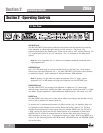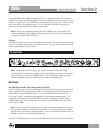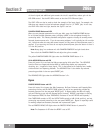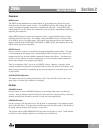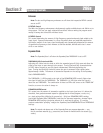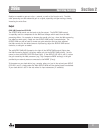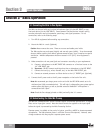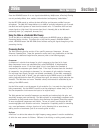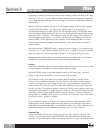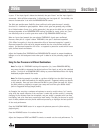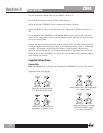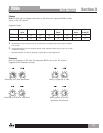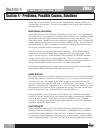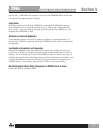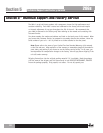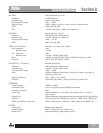
286
Section 3
Basic Operation
12
by blowing air through a constricted (narrow) mouth opening or across the edge of the teeth,
as in the “s” and “sh” in “sash.” Sibilants contain predominantly high frequency components
with a sharp rise above 1kHz and most of the energy in the 4kHz to 10kHz band, centered on
6kHz to 8kHz.
Adjust the De-Esser’s frequency control to set the frequency above which the 286s responds
to audio containing sibilants. The 286s detects sibilant material by comparing the
high-frequency energy of an audio signal to the full bandwidth energy of that signal. When
the high-frequency energy is excessive relative to the full bandwidth energy, the 286s quickly
reduces the gain, or “de-esses.” The frequency control sets the high-pass filter frequency of
the high-frequency level detector. For normal vocal de-essing, the frequency should be set
between 4-8kHz. Further adjustment of the frequency control enables the 286s to be used
for processing instrumental material, such as removing “clicks” from a close mic’d piano or
acoustic guitar.
Adjust the De-Esser’s THRESHOLD control to quickly reduce any sibilance (i.e., excessive vocal
sounds like “sss”), high-frequency overload distortion (e.g., a cymbal crash that can overload
tape, drive amps into distortion and fatigue listeners), or even guitar string slide noise.
We recommend the 286s De-Esser for use almost exclusively on single voices or instruments
for sibilance. The De-Esser should not be used on mixed program material.
Enhancer
An Enhancer (sometimes called a Spectral Enhancer) adds clarity and detail to vocals or other
line level signals by “intelligently’ boosting specific frequency ranges.
Use the HF DETAIL control to add high frequency energy to the input signal. Use the LF
DETAIL to add punch and definition at the lower end of the spectrum.
The HF Detail circuitry in the 286s uses a dynamic shelving equalizer to provide results
superior to even complex equalization. In many situations, the amount of high frequency
content in the material you are working with will vary. Typical equalization schemes will
produce results which are right some of the time, and completely wrong at other times. But
not with the 286s. The equalizer’s dynamic operation and sliding corner frequency ensure that
high frequency enhancement is applied only when needed and in the specific frequency range
necessary to maintain proper spectral balance moment to moment. HF detail is perfect for
adding definition to muddy vocals, guitar or horn tracks. It can also add “zing” and crispness
to percussion tracks - acoustic or sampled.
As you increase the amount of LF Detail, the circuitry boosts lower bass frequencies while
simultaneously cutting problem frequencies in the upper bass/low midrange region which
often makes program material muddy. Use LF Detail to create a “big,” chesty, male voice or to
add fullness and power to lower frequency percussives (e.g., kick, toms, timpani).
Expander/Gate
A Gate is essentially a device that controls the level of an input signal by “opening” and
“closing.” A user-selected level, called THRESHOLD, helps determine when the gate opens
and closes. If the input signal is above the threshold, the gate is “open,” allowing the signal
286s



